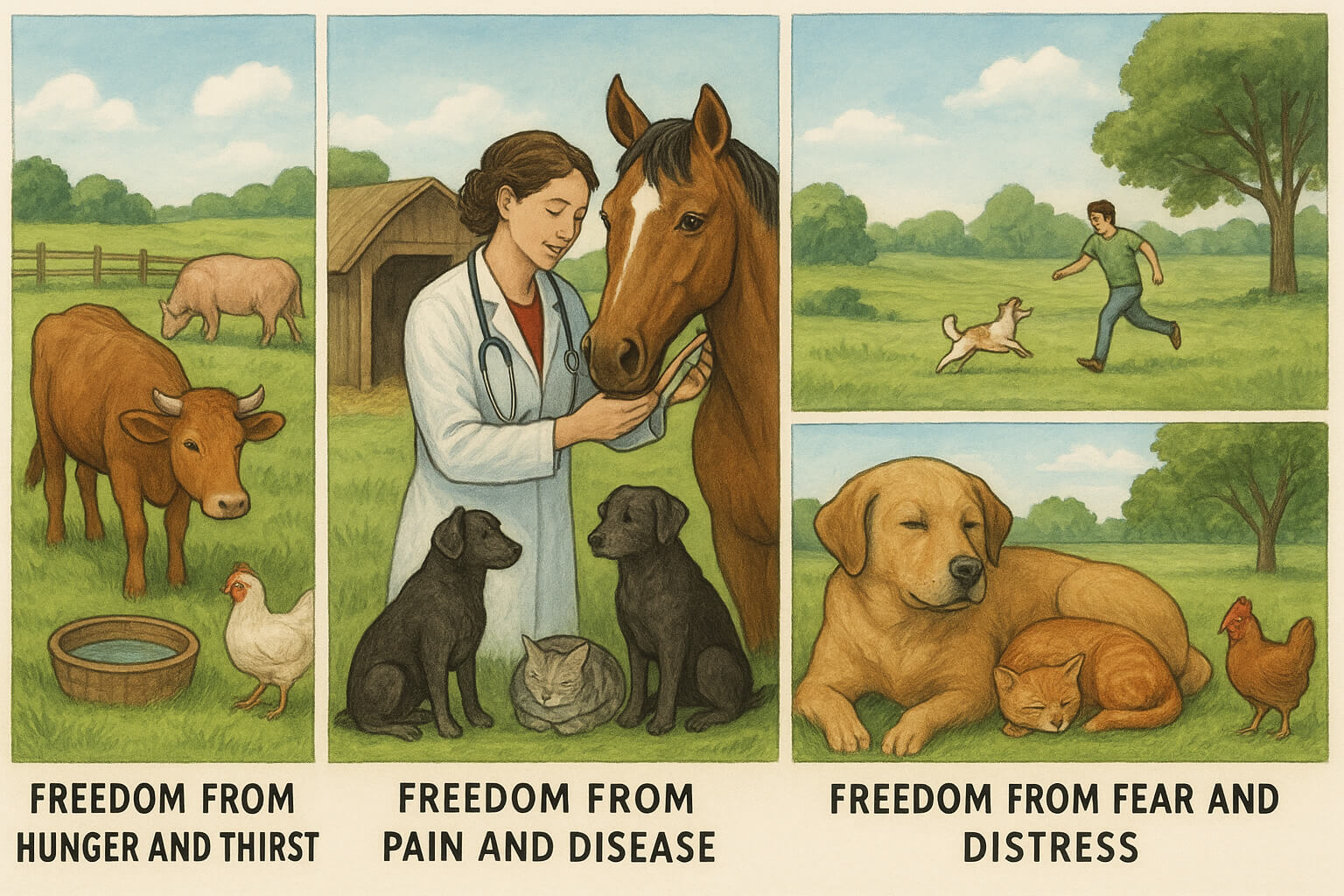September 08, 2025

Animal welfare is far more than the absence of overt cruelty—it is about ensuring that animals live meaningful, healthy lives where their physical, emotional, and behavioral needs are met. It’s about recognizing animals as sentient beings who feel pain, joy, fear, and comfort, and then acting accordingly to promote their well-being.
To provide a universal framework for responsible care, the Five Freedoms of Animal Welfare were introduced in 1965 by the UK’s Brambell Committee and have since become the cornerstone of animal welfare policy worldwide.
Today, organizations like the World Organisation for Animal Health (OIE) and World Animal Protection uphold these standards as the minimum ethical baseline for the treatment of animals—whether in agriculture, homes, laboratories, or the wild.
Each of the Five Freedoms addresses a different aspect of an animal’s well-being, ensuring a holistic approach to care. They are not merely ideals but practical, achievable goals for anyone who interacts with animals.
“Animals must have access to fresh water and a diet that maintains full health and vigor.”
This first freedom is foundational—no animal can thrive without nourishment. It goes beyond just feeding; it includes the quality, availability, and appropriateness of food and water for each species.
Further reading: Understanding Food Insecurity and Who Does It Affect
“Animals must have an appropriate environment, including shelter and a comfortable resting area.”
Animals, like humans, require a stable, safe, and clean habitat to feel secure. Environmental factors such as temperature, lighting, bedding, and shelter from the elements significantly influence an animal’s comfort.
More Resource: RSPCA – Five Freedoms
“Animals must be treated promptly and appropriately to prevent suffering and maintain good health.”
Health care is not optional—it’s essential. This freedom emphasizes the importance of proactive and reactive medical care, as well as the need for safe environments that prevent injury or illness from occurring in the first place.
Related Article: How Medical Research is Changing Lives
“Animals must be provided with sufficient space, proper facilities, and company of the animal’s own kind.”
Every species has natural behaviors they are biologically and psychologically wired to perform. Denying animals the chance to express these behaviors leads to frustration, boredom, and psychological distress.
This freedom supports the use of environmental enrichment, species-appropriate toys, exercise, and socialization.
See Also: Why Animal Adoption is the Best Option
“Animals must be protected from conditions that cause mental suffering.”
Emotional and psychological well-being is often overlooked, yet it is just as important as physical health. Animals feel stress, anxiety, and fear—especially when they are subjected to loud noises, sudden movements, overcrowding, abuse, or neglect.
Learn More: Understanding Animal Cruelty: What You Can Do to Help
The Five Freedoms provide more than a checklist—they are a moral framework that reflects society’s evolving relationship with animals. In an age of industrial farming, animal testing, illegal wildlife trade, and pet overpopulation, these freedoms challenge individuals, businesses, and governments to do better.
From influencing legislation to shaping certification programs like Certified Humane and Animal Welfare Approved, the Five Freedoms have transformed how we view and treat animals. They call us to choose compassion over convenience, and ethics over exploitation.
Recommended Organization: World Animal Protection works globally to eliminate animal suffering in all its forms.
You don’t need to be a veterinarian or policymaker to support animal welfare. Every individual action counts. Here are some practical steps you can take today:
The Five Freedoms are more than just principles—they are promises. Promises that we, as humans, have a responsibility to uphold. Whether you’re caring for a beloved pet, choosing food at the grocery store, or voting on policy, your decisions shape the lives of animals.
Let’s ensure that all animals—no matter where they live or what their role is—can experience a life free from suffering, and rich in dignity.
Stay up to date with the latest tips, expert insights, product reviews, and step-by-step guides to help you grow, create, and succeed—no matter your industry or passion.